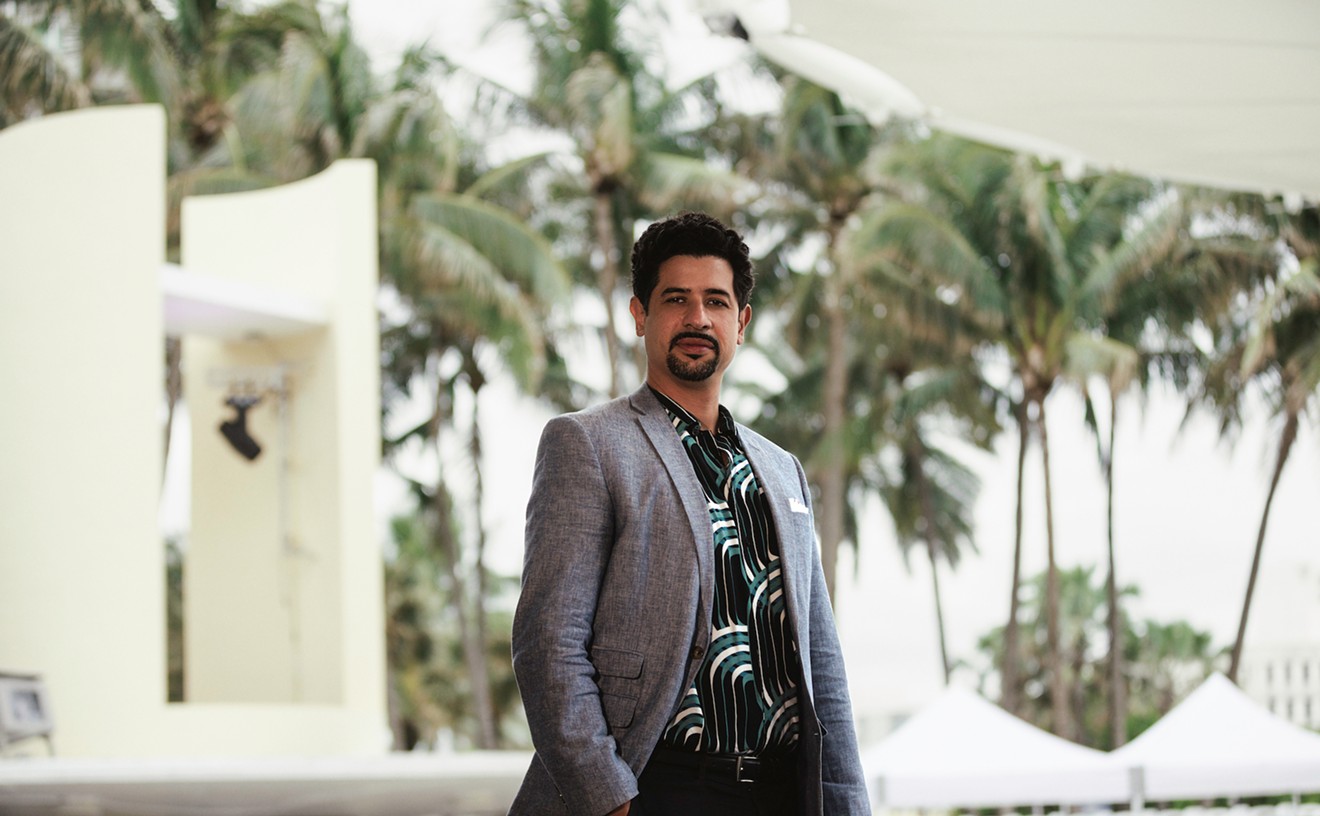New Times: What was your original concept for the Afro-Cuban All Stars, and how has it progressed since the first album -- 1998's A Todo Cuba Le Gusta -- for which you were nominated for a Grammy? Has the music evolved in unexpected ways?
Juan de Marcos Gonzalez: The idea behind Afro-Cuban All Stars is to get several generations of Cuban musicians together in a tribute to Cuban music and to try to break down the obstacles created by more than 40 years of isolation [in Cuba]. It's an ambitious project, not a band. The only real requirement for the participants is to possess a very high level of musical ability and to want to play Cuban music without making any concessions whatsoever.
Beginning with A Todo Cuba Le Gusta, the original idea was to pay tribute to the music of the Fifties with some of the members of that generation -- Cachaito Lopez, Ibrahim Ferrer, Ruben Gonzalez, Puntillita, Pio Levya, et cetera. After that record we did Buena Vista Social Club [produced by Ry Cooder] with practically the same lineup -- and you know what happened.
In 1999, with Distinto, Diferente, I decided to change direction somewhat and make an album mixing generations that emphasized the younger musicians and their ideas. Without losing the essence of "Cubanness," the music sounded more contemporary.
My intentions remain the same. It's necessary to project the values of Cuban culture into the future. The goal is to maintain the essence and the roots of our national music but also to include and involve young people. If you don't do that, there will be no continuity. I love traditional Cuban music. But contemporary Cuban music also exists, and we have to give everything its space.
There are a lot of people who don't agree with me. Three record companies have asked me to keep producing Buenavistas. But I'm not interested. Everything has its moment. The important thing about Afro-Cuban All Stars is bringing young and old people together through a common goal.
What effect has the international success of Buena Vista and Afro-Cuban All Stars had on musicians in Cuba?
I think my real contribution has been to open the eyes of a young generation of musicians in Cuba to the fact that we have a history. I think Cuba is the only country in the world where there exists such a diversity of popular genres. The recent timba generation underestimated the potential of classic popular music and overestimated the legacy of the free-jazz bands à la Weather Report and of hip-hop, but that didn't last. I'm not saying that Issac Delgado has to sing a danzón just like Barbarito Diez. But he should sing danzones, too -- more contemporary ones with more complicated or improvised chords but danzón just the same.
After the success that I had with the old guys, there was a widespread return to the classic Cuban sound among the young timba bands. And that was very positive. Of course it wasn't a mimetic return; it was a reinterpretation of our musical history. We've become soneros par excellence again, and that's the point. There has to be fusion without forgetting.
What made you want to work with Felix Baloy? What is his history in Cuba, and what makes him a standout singer?
Felix Baloy is one of the most important, if not the most important, sonero of the Seventies and Eighties. As Pedro Calvo [former lead singer of Los Van Van] is but with a different style, which combines a gravelly tone with the full harmony of soneros of the old Cuban school, like Miguelito Cuni and Beny Moré, with the inflections of the modern Cuban singers. He sings with a rumbero's stylings. I've worked with Baloy since I founded the Afro-Cuban All Stars and worked on Buena Vista Social Club. He sang on the first and second All Stars albums.
Incredibly, in spite of having recorded extensively with bands of the caliber of Adalberto Alvarez, Son 14, and Orquesta Reve, he had never done a solo disc. So when Mo Fini of Tumi Records asked me to produce this record, I didn't think twice.
How did you choose the repertoire for the album? What are some of your favorites?
Baloy wanted to do an album of traditional son, and that's what we did. There are classic songs, together with newer compositions by friends like Adalberto Alvarez, that fit in with the style that we wanted to follow. It's a mix of interesting new takes on standards like "Mami Me Gusto" by Lili Martinez and original music written for this album. There are also a couple of real traditional-style tracks by Baloy himself -- the bolero "Después de Esta Noche" and "El Son de Baloy." I did the arrangements with Efrain Rios, a mutual friend and great musician.
I wrote a song for the album -- it's a guaracha called "Cada Vez Que Te Veo," a picaresque song with the kind of double meaning common in Cuban lyrics, about a woman with "torn stockings," which is the same thing as saying she's naked. We have a good time with this one when we perform it live. I wrote it especially for Felix; another singer couldn't perform it the same way. Even people who don't speak Spanish like the song. I like it too, which is rare. I'm usually never satisfied with my songs.
My favorite songs on the album are "Yo Soy El del Sentimiento" by Efrain Rios, and the rumba "Misericordia No Aguanto," which contains an unusual mix of changüí [the ancestor of son montuno] and guaguancó, as well as some very streetwise language, which uses some extremely erudite words as well as some incredible profanities.
Who are some of the musicians who played on the album?
The musicians in the band are all extraordinary, with one essential common thread: They are all Baloy's close friends or family. Victoriano "Filiberto" Sanchez, one of the greatest Cuban drummers of the Sixties, played the timbales. The brass section includes the youngsters in my band -- Molote Martinez, Yanko Pisako, Yaure Muniz, and also trumpet master Cucho Pichardo. The great Dave Alfaro is on piano. Of course it was also a great privilege to have special guests like legendary percussionist Tata Guínes and the director of the Ritmo Oriental orchestra, Enrique Lazaga.
You've recently founded your own production company.
¡Ahora! is my independent production company. I did the Baloy record under that label, and I'm now making a record with my brother and great drummer, Amadito Valdes. Future productions will include not only traditional music and Afro-Cuban jazz but also other current sounds, like a very Cuban brand of hip-hop that we're hearing a lot now in Cuba.
I've always had the same philosophy. I don't make concessions. I make culture, not money. When they can coincide as they have up until now, I'm happy. My principal objective is to bring international attention back to our music. I'm not interested in just hits or ephemeral successes. If for almost two-thirds of a century we dominated the tropical-music market all over the world, we can do it again. Potential we have.










